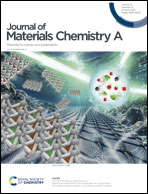Giant Stark effect assisted radio frequency energy harvesting using atomically thin earth-abundant iron sulphide (FeS2)†
Abstract
The advancement in two-dimensional (2D) materials has led to the development of new charging methods in portable and wearable electronic devices. However, their charging methods are still confined to contact/wired mode. Radio Frequency (RF) energy harvesting exhibits potential for extracting electrical power from the environment, benefiting from its limitless ambient availability and extended power transfer capabilities. This paper demonstrates the fabrication of an RF energy harvesting device using liquid phase exfoliated atomically thin earth-abundant pyrite ore (iron sulfide (FeS2)). Owing to pyrite's unique semiconductor properties such as a very small narrow band gap (0.8 eV) and high carrier mobility (360 cm2 V−1 s−1), it is possible to make a Schottky junction with a metal electrode. Hence, we fabricated a Schottky device employing a Ti/2D-FeS2/ITO configuration using drop casting methods. Electrical measurements reveal that the device has a low turn-on voltage of 0.18 V and a low Schottky barrier height of 0.14 eV. To substantiate the role of 2D-FeS2, density functional theory (DFT) studies were performed revealing the impact of the Giant Stark Effect (GSE) in lowering the bandgap of 2D FeS2. This insidious phenomenon of GSE in 2D-FeS2 makes it an ideal material of choice for RF energy harvesting applications. The device we fabricated functions within the commercial frequency modulation broadband range and extends seamlessly into the very high-frequency radio spectrum. It generated a 1.5 V output voltage using commercial FM broadband frequencies, sufficient for charging a 1.5 F supercapacitor. Subsequent experimentation with a handheld walkie-talkie demonstrated that the device could achieve a maximum voltage of 3.5 V within the one-meter range, exhibiting an efficiency of 30%. The implications of this discovery suggest that 2D-FeS2-based wireless energy-powered portable devices hold promise for healthcare/biomedical device applications, energy harvesting in remote areas, and regions affected by floods or natural disasters.



 Please wait while we load your content...
Please wait while we load your content...